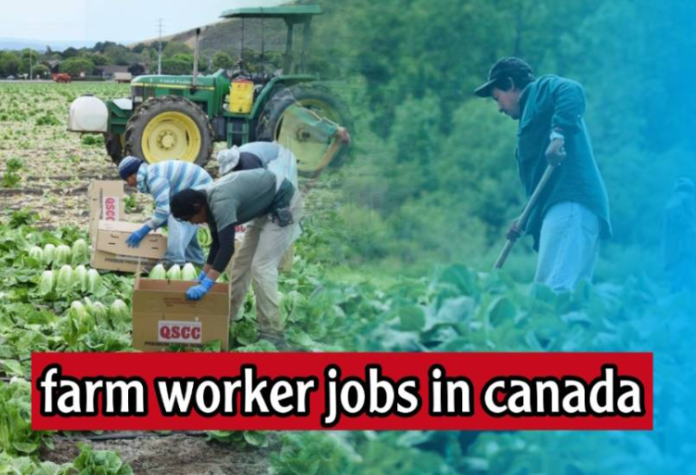Ever dreamt of wide-open fields, fresh air, and the satisfaction of working with your hands? Look no further than farm jobs in Canada with visa sponsorship!
This exciting opportunity combines the allure of a beautiful country with a fulfilling career path, all while offering a gateway to Canadian life.
Why Choose Farm Jobs in Canada with Visa Sponsorship?
While the vast Canadian farmlands and fresh air are undeniable draws, farm jobs in Canada with visa sponsorship offer a unique package that goes far beyond a simple change of scenery. Let’s delve deeper into the reasons why this opportunity might be the perfect seed to sow for your future:
-
Streamlined Visa Process
Obtaining a work visa can be a labyrinthine journey. Farm jobs with visa sponsorship act as a helpful guide, simplifying the process by shifting the responsibility to the employer. They navigate the paperwork and advocate for your eligibility, saving you time, stress, and potentially hefty fees. This allows you to focus on getting ready for your new role and the exciting adventure that awaits.
-
A Booming Industry with Endless Opportunities
Canada’s agricultural sector is a powerhouse, consistently requiring skilled and dedicated workers. This high demand translates to a plethora of job options that cater to diverse skillsets and interests. Whether you’re drawn to the intricacies of animal care, the satisfaction of tending crops, or the technical challenges of operating machinery, there’s a role waiting to be filled by someone with your drive.
-
Immerse Yourself in the Canadian Way of Life
Working on a Canadian farm isn’t just about the work itself. It’s about immersing yourself in a vibrant and welcoming culture. You’ll have the chance to build connections with locals, experience the unique rhythm of life in rural Canada, and gain a newfound appreciation for the land that sustains us all. Explore charming towns, breathtaking landscapes, and vibrant festivals – Canada offers a tapestry of experiences waiting to be woven into your story.
-
A Platform for Personal and Professional Growth
Farm jobs in Canada are more than just manual labor. They offer opportunities to develop valuable skills. You’ll learn about different agricultural practices, gain expertise in operating equipment, and potentially even hone your leadership abilities. This newfound knowledge not only strengthens your resume but also empowers you to navigate a successful career path in the agricultural sector.
-
A Path to a Brighter Future
Farm jobs in Canada with visa sponsorship can be the stepping stone to a life-changing experience. Many programs offer pathways to permanent residency. This means that with hard work and dedication, you could potentially build a future in Canada, a country renowned for its high quality of life, excellent healthcare system, and diverse opportunities.
Farm jobs in Canada with visa sponsorship are an opportunity brimming with potential. It’s a chance to work hard, learn new things, experience a new culture, and potentially pave the way for a fulfilling life in Canada.
Types of Farm Jobs with Visa Sponsorship
Canada’s farmlands offer a diverse range of roles, each with its own unique set of challenges and rewards. Let’s delve into some of the most common farm jobs with visa sponsorship, along with their average annual salaries:
-
General Farm Worker
Average Salary: $29,892 CAD
This is the jack-of-all-trades position in the agricultural world. General farm workers handle a variety of tasks, including:
- Planting and harvesting crops (fruits, vegetables, grains)
- Operating and maintaining basic farm equipment
- Tending to livestock (feeding, watering, cleaning)
- General farm maintenance (fencing, irrigation)
-
Livestock Worker
Average Salary: $32,100 CAD
Calling all animal lovers! Livestock workers specialize in the care and management of various animals:
- Dairy Farm Workers: Milk cows, maintain milking equipment, ensure cow health and well-being
- Poultry Farm Workers: Care for chickens, turkeys, or ducks, manage breeding and feeding, collect eggs
- Ranch Workers: Look after cattle or other large animals such as bison or horses, manage grazing land, assist with breeding and birthing
-
Greenhouse Worker
Average Salary: $31,540 CAD
If you crave a controlled environment, consider greenhouse work. These roles involve:
- Nurturing a variety of plants (fruits, vegetables, flowers)
- Maintaining optimal growing conditions (temperature, humidity, light)
- Monitoring plant health and applying necessary treatments
- Harvesting and preparing produce for market
-
Agricultural Equipment Operator
Average Salary: $38,700 CAD
Get behind the wheel and master the machinery that keeps farms running! These jobs involve:
- Operating tractors, combines, harvesters, and other specialized equipment
- Performing preventative maintenance on machinery
- Ensuring safe and efficient operation of equipment during planting, harvesting, and other farm activities
-
Specialized Farm Roles
Average Salary: Varies depending on harvest season
Beyond these core roles, there are specialized farm opportunities depending on the farm’s focus. These might include:
- Aquaculture Worker: Raising fish, shellfish, or other aquatic life in controlled environments. Requires knowledge of water quality management and feeding techniques.
- Farm Mechanic: Keeping farm machinery running smoothly with your repair and maintenance skills.
- Horticulture Technician: Specializes in the care and cultivation of ornamental plants, flowers, and trees.
-
Orchard Worker
Average Salary: $30,456 CAD
Tend to sprawling orchards, nurturing fruit trees from blossom to harvest. Responsibilities may include:
- Pruning and maintaining fruit trees
- Monitoring fruit development and quality
- Harvesting fruits (apples, pears, peaches, etc.)
- Packing and sorting harvested fruits
-
Apiary Worker
Average Salary: $34,200 CAD
Become a beekeeper and contribute to the vital world of pollination! Apiary workers manage beehives, ensuring the health and productivity of honeybees:
- Setting up, inspecting, and maintaining beehives
- Collecting honey and beeswax
- Controlling pests and diseases that threaten bee colonies
-
Viticulture Technician
Average Salary: $36,800 CAD
For those fascinated by the art of winemaking, viticulture offers a rewarding path. Viticulture technicians care for grapevines, ensuring optimal growth for quality wine production:
- Pruning and training grapevines
- Monitoring grape development and health
- Assisting with grape harvest
- Implementing sustainable viticulture practices
-
Sugar Beet Harvester
Average Salary: Varies depending on harvest season
If you thrive in a fast-paced environment, consider seasonal sugar beet harvesting. This role involves operating specialized machinery to extract sugar beets efficiently during harvest season:
- Operating combine harvesters or other specialized equipment
- Ensuring clean and efficient harvesting of sugar beets
- Working long hours during the harvest window
Remember, these are average salaries and can vary depending on experience, location, and the specific farm. Some farms offer benefits packages that include housing, meals, or health insurance on top of the base salary.
Finding the Perfect Fit: Consider your interests, skills, and physical capabilities when choosing a farm job. Research the specific tasks involved in each role to ensure it aligns with your expectations.
Eligibility Requirements for Farm Jobs in Canada with Visa Sponsorship
Landing any of the farm jobs in Canada with visa sponsorship is an exciting prospect, but before you dive headfirst into the application process, it’s crucial to understand the eligibility requirements. Here’s a breakdown of some key factors:
-
Job Offer from a Licensed Employer:
The foundation of your journey lies in securing a job offer from a licensed employer. This means the farm has obtained a positive Labour Market Impact Assessment (LMIA) from Employment and Social Development Canada (ESDC). The LMIA demonstrates that the employer has made a genuine effort to recruit Canadian citizens or permanent residents for the position but couldn’t find suitable candidates.
-
Relevant Skills and Experience (May Vary):
While specific skills may differ depending on the role, demonstrating a willingness to learn and a strong work ethic is universally valued. Some positions might require previous experience in agriculture, while others may prioritize skills relevant to the specific tasks involved (e.g., operating machinery for equipment operators). Highlight any relevant experience and skills in your resume and cover letter to stand out from the crowd.
-
Educational Background (Generally Flexible):
Farm jobs in Canada typically don’t require advanced degrees. However, having a basic education and any training relevant to agriculture can be beneficial. For instance, some specialized roles, like viticulture technicians, might prefer applicants with diplomas in horticulture or viticulture.
-
Language Proficiency (May Vary):
While fluency in English or French isn’t always mandatory, possessing basic proficiency can significantly enhance your ability to communicate effectively with colleagues, supervisors, and clients.
-
Clean Criminal Record and Medical Exam:
In most cases, you’ll need to provide a police certificate from your home country to demonstrate a clean criminal record. Additionally, depending on your nationality and the specific program, you might be required to undergo a medical examination.
-
Meeting Program-Specific Requirements:
Canada offers various programs for temporary foreign workers in agriculture. Each program might have additional eligibility requirements. Research the specific program your potential employer is utilizing for visa sponsorship to ensure you meet all necessary criteria.
Tips for Strengthening Your Application:
- Tailor your resume and cover letter to highlight relevant skills and experiences for the specific farm job.
- Research Canadian agricultural practices to demonstrate your genuine interest in the industry.
- Prepare for potential interview questions about your motivation for working in Canada and your willingness to adapt to a new work environment.
By understanding the eligibility requirements and presenting a strong application, you can increase your chances of securing a farm job in Canada with visa sponsorship and embarking on a fulfilling agricultural adventure!
Frequently Asked Questions about Farm Jobs in Canada with Visa Sponsorship (FAQs)
Here are some of the common questions people ask about the various Farm Jobs in Canada with Visa Sponsorship:
Q: What tips can help me strengthen my application?
A: Tailor your resume and cover letter to the specific role, research Canadian agricultural practices, and prepare for interview questions about your motivations and willingness to adapt.
Q: Is there a path to permanent residency through farm jobs in Canada?
A: Yes! Some programs offer pathways to permanent residency with hard work and dedication. Research the specific program your potential employer uses for visa sponsorship.
Q: Is there a physical fitness requirement for farm jobs?
A: Generally, yes. Farm work often involves physical tasks like lifting, bending, and working outdoors in various weather conditions. Be honest about your physical capabilities when applying for a role.
Q: What kind of housing might be provided by farms?
A: Some farms offer on-site housing, which can range from dormitories to individual rooms. This can be a cost-effective option, but amenities and living arrangements will vary.
Q: Are there cultural differences I should be prepared for?
A: Absolutely! Embrace the opportunity to learn about Canadian culture and agricultural practices. Be respectful of your colleagues and open to trying new things.
Q: What are some additional costs I should consider besides the salary?
A: Depending on your situation, you might need to factor in travel costs, visa application fees, medical exam fees, and potentially some initial living expenses if on-site housing isn’t provided.
Q: Can I bring my family when I work on a farm with a visa sponsorship?
A: This depends on the specific program and the type of visa obtained. Research the program details and consult with immigration authorities for clarification.
Q: What happens after my work contract ends?
A: This depends on the terms of your contract and the program you participated in. Explore the possibility of extending your contract or transitioning to another farm job if you wish to stay in Canada longer.
Q: Is there any support available for foreign workers on Canadian farms?
A: Yes! Some provinces offer support services to assist foreign workers with settling in, understanding their rights, and accessing resources. Research what support programs might be available in your specific location.
Q: What are some tips for adapting to a new work environment on a farm?
A: Be proactive, ask questions, and show a willingness to learn. Be patient with yourself as you adjust to new routines and physical demands. Connect with your colleagues and build positive relationships.
Q: What are some resources I can use to learn more about farm life in Canada?
A: Explore websites of agricultural associations, government websites on agriculture, and online forums for farm workers in Canada. Consider watching documentaries or reading agricultural publications for a deeper understanding of the industry.
This unique opportunity can be a stepping stone to a fulfilling career and a life-changing experience in a beautiful country.
See More Jobs and Apply Here
Conclusion
Farm jobs in Canada with visa sponsorship offer an exciting opportunity to explore a new country, gain valuable skills, and contribute to a vital industry. With dedication and hard work, this experience can be the first step towards a fulfilling career and a potential path to a permanent life in Canada.
When applying for farm jobs with visa sponsorship, highlight your hard work ethic, willingness to learn, and any relevant skills you possess. Research Canadian farm practices and demonstrate your enthusiasm for the agricultural industry.












